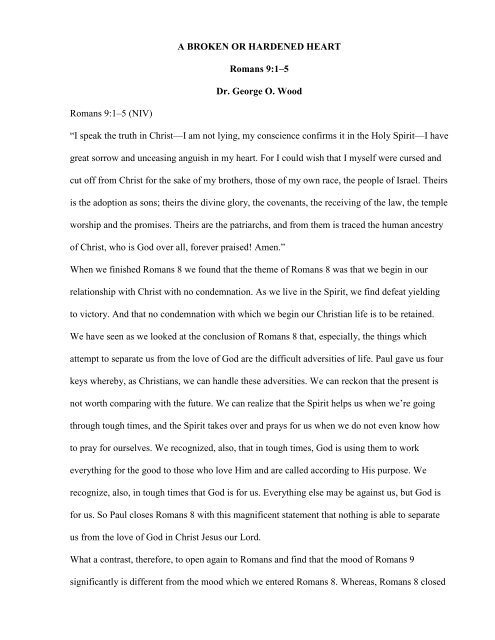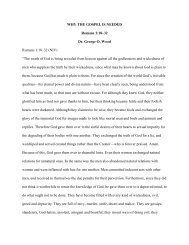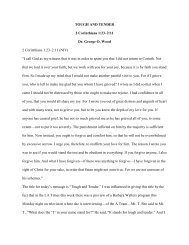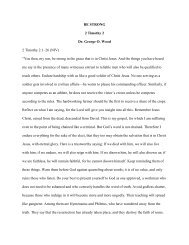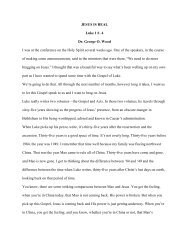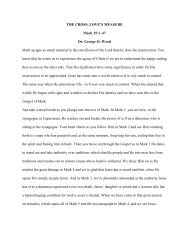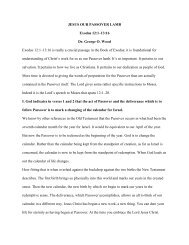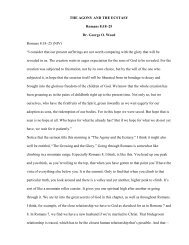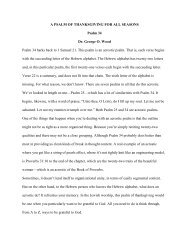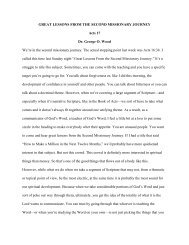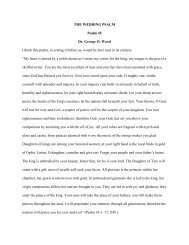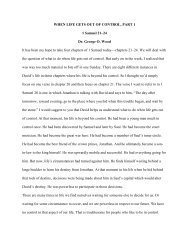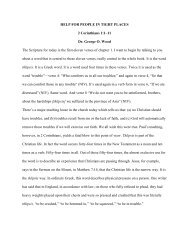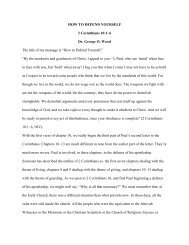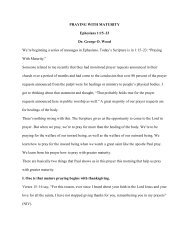21 A BROKEN OR HARDENED HEART.pdf - Dr. George O. Wood
21 A BROKEN OR HARDENED HEART.pdf - Dr. George O. Wood
21 A BROKEN OR HARDENED HEART.pdf - Dr. George O. Wood
You also want an ePaper? Increase the reach of your titles
YUMPU automatically turns print PDFs into web optimized ePapers that Google loves.
A <strong>BROKEN</strong> <strong>OR</strong> <strong>HARDENED</strong> <strong>HEART</strong>Romans 9:1–5<strong>Dr</strong>. <strong>George</strong> O. <strong>Wood</strong>Romans 9:1–5 (NIV)―I speak the truth in Christ—I am not lying, my conscience confirms it in the Holy Spirit—I havegreat sorrow and unceasing anguish in my heart. For I could wish that I myself were cursed andcut off from Christ for the sake of my brothers, those of my own race, the people of Israel. Theirsis the adoption as sons; theirs the divine glory, the covenants, the receiving of the law, the templeworship and the promises. Theirs are the patriarchs, and from them is traced the human ancestryof Christ, who is God over all, forever praised! Amen.‖When we finished Romans 8 we found that the theme of Romans 8 was that we begin in ourrelationship with Christ with no condemnation. As we live in the Spirit, we find defeat yieldingto victory. And that no condemnation with which we begin our Christian life is to be retained.We have seen as we looked at the conclusion of Romans 8 that, especially, the things whichattempt to separate us from the love of God are the difficult adversities of life. Paul gave us fourkeys whereby, as Christians, we can handle these adversities. We can reckon that the present isnot worth comparing with the future. We can realize that the Spirit helps us when we‘re goingthrough tough times, and the Spirit takes over and prays for us when we do not even know howto pray for ourselves. We recognized, also, that in tough times, God is using them to workeverything for the good to those who love Him and are called according to His purpose. Werecognize, also, in tough times that God is for us. Everything else may be against us, but God isfor us. So Paul closes Romans 8 with this magnificent statement that nothing is able to separateus from the love of God in Christ Jesus our Lord.What a contrast, therefore, to open again to Romans and find that the mood of Romans 9significantly is different from the mood which we entered Romans 8. Whereas, Romans 8 closed
A <strong>BROKEN</strong> <strong>OR</strong> <strong>HARDENED</strong> <strong>HEART</strong>Romans 9:1-5on this high plain of triumph, Romans 9 begins on the low plain of despair and sorrow. Thereason why it is thus is Paul has been talking about the fact that there is no separation from thelove of God. He must come head-up with the theme that God‘s ancient people—the peoplewhom he first called in Abraham, Isaac, and Jacob—have now experienced a separation fromGod. He has seen in his ministry and the relationship of his people to Jesus of Nazareth, thatthere has been a rejection of Jesus. On the one hand, he‘s been saying, ―There is no separation ofthose who are in Christ.‖ He must now come to grips with the objection, ―Will not God, if Hehas separated himself from His ancient people, also at one time, perhaps, separate himself fromthe people of God who are in Christ Jesus?‖ Has God failed somewhere along the line to keepHis covenant with His people, the people of Israel? If God is no longer with them in the elect sortof way that the Old Testament said that He was, can we be guaranteed that He will be with us aswell?It is this theme that Paul is seeking to address in Romans 9, 10, and 11. He addresses it from thestandpoint of Romans 9, God‘s dealings in the past with His people; and Romans 10, God‘sdealings in the present with Israel; and Romans 11, God‘s dealings in the future with Israel. Hewill take this tremendous objection that is raised and turn it and provide sharp insight into God‘sdealings and relationship with His people. Paul‘s heart is filled with anguish and sorrow becausehe has seen repeatedly, in his travels and in his ministry, the rejection of Jesus by his Jewishkinsmen. Paul has begun the Book of Romans by saying the gospel is proclaimed to the Jew first.By that, of course, Paul is indicating that Jesus came to His own first. And wherever Paultraveled in his missionary journeys, he first went to the synagogue. It was the natural place togo—to take people who had already been schooled in the Scriptures and give them thatconsummation of the Scriptures, Jesus Christ. But he had seen repeatedly in synagogue aftersynagogue that his message had been rejected.2
A <strong>BROKEN</strong> <strong>OR</strong> <strong>HARDENED</strong> <strong>HEART</strong>Romans 9:1-5He is now facing the task of coming to Jerusalem with an offering for the Jerusalem saints. Hedoes not know that immediately ahead of him there is that imprisonment in Jerusalem. And thereis that rejection which he will experience again by the chief priests and the elders and the scribes.He does not know, but his heart is troubled within him as he expects that something awful isbreaking on the horizon. It will be the total destruction of Jerusalem in 70 A.D. So he writesfrom the context of the gathering momentum of rejection of Jesus by His own.In John 1:11, John says, ―He came to His own, and His own people received Him not.‖ Paul isattempting to get at the reason why Jesus is not received by His own. As Paul contemplates this,he says he has sorrow and anguish of heart that his kinsmen after the flesh have failed to respondto Jesus.Before we head into this theme and look at the anguish of Paul‘s heart, I want to say a couple ofthings about the relationship in modern times—in our day and age—between Christians andJewish persons. There have often been misunderstandings in this respect as to what the NewTestament is teaching. There are two things that the New Testament clearly does not teach. Andanyone who comes in the name of Christ and teaches them is teaching some other gospel.The first thing that the New Testament never says is that the Jews, as a race, are responsible forkilling Christ. This has been something which has been bandied about for centuries and has beenwrongly used at times by persons who have not adequately understood the new message. If youcarefully examine the New Testament preaching—especially in Acts 2, which is the example ofapostolic preaching—you will find that once the preaching of the gospel of Jesus Christ takesplace outside the perimeter of Jerusalem, never, ever is a Jewish audience charged with thecrucifixion of Jesus Christ. It is only those who were directly involved in that crucifixion inJerusalem who were made responsible. And thus, Acts 2 and 4 and 5 address these persons. Butonce you get past the Jerusalem borders, never is that charge made. The charge against Jews who3
A <strong>BROKEN</strong> <strong>OR</strong> <strong>HARDENED</strong> <strong>HEART</strong>Romans 9:1-5do not believe the gospel of Jesus Christ is the same as the charge against Gentiles who do notbelieve the gospel. It is one of hardness of heart. But it is not one of implication of the actualmurder of Christ himself. Spiritually, in a sense, all who stand outside of receiving Jesus‘message are responsible for His death. But the actual responsibility for putting Him on the crossis not the Jewish race as a whole.I remember once at Evangel College we had a rabbi who addressed the students. When he wasfinished, I was embarrassed and humiliated beyond words. One of the students—I think he musthave been a freshman—stood up and raised the question, ―Why did you Jews kill Christ?‖We need to very carefully look at what the New Testament is saying and recognize that both theJew and Gentile stand in need of the gospel of Jesus Christ. When that gospel is unbelieved, thesin is unbelief. It is not crucifixion.The second thing that we need to say is there is never any ground for a Christian, because he is aChristian, assuming it is in his prerogative to ridicule or discriminate or persecute persons ofJewish faith and ancestry. Jewish jokes and anti-Semitic discrimination and literature and the likehave no part in the life of a person who is truly bound by the love of Jesus Christ and has comein contact with the love of Jesus Christ for the world, for every person—for the Jew and also tothe Gentile.So saying that, we come to this passage today, Romans 9:1–5, which talks to us, on the one hand,in the first three verses about a broken heart. And in verses 4 and 5, if you will, I would say thatthese verses talk to us about a hardened heart.I. First, a broken heart.Paul‘s heart is broken. He has great sorrow and anguish when he considers the plight of hispeople by race, his kinsmen after the flesh who are not responding to Jesus.4
A <strong>BROKEN</strong> <strong>OR</strong> <strong>HARDENED</strong> <strong>HEART</strong>Romans 9:1-5When I was at the General Council of the Assemblies of God last week, I heard a message by theeditor of ―Christianity Today,‖ which burned a deep mark in my life. I want to share it with youbecause it ties in with what Paul is saying here. He asked us five questions. He said, ―Thesequestions are so simple, they require a simple ‗yes‘ or ‗no‘ answer on the part of everyone in thisroom.‖ As a listener, I am sometimes suspect when anybody sets me up that simply. Having beenaround a little bit in education, I realize that sometimes the answer is not yes or no. It‘s sort of inbetween, and you can argue both sides. So when he said that, my defenses immediately went up.I thought, ―It can‘t be that simple!‖ Then he asked the questions. As he did, I recognized thatindeed the answers were that simple. I ask these questions to you in this room today. As we godown the questions, we see how they tie in with Paul‘s feelings.The first question is this: Are you a member of the company of the converted? Jonathan Edwardssaid about the world (here is a Puritan preacher two centuries ago gripped by the Spirit of God):―The whole world can be divided not by its ethnic division, not by its language divisions, not byits racial divisions. But the whole world can be divided into two groups—the company of theconverted and the company of the condemned.‖ Are you, this morning, a member of thecompany of the converted, those who have yielded to the claims of Jesus Christ as the Savior andLord of your life?Are you a member of the company of the committed? The company of the converted is a largercircle that embraces all those who have come to Christ. I would submit that the company of thecommitted is a circle within the circle. It is those who have not only accepted Jesus as Savior, buthave embraced Him as Lord and have given their lives and their talents and their time to Him,and in the daily disciplines and affairs of life are seeking continually to make Him preeminentand Lord. Are you a member of the company of the committed?5
A <strong>BROKEN</strong> <strong>OR</strong> <strong>HARDENED</strong> <strong>HEART</strong>Romans 9:1-5Are you a member of the company of those being filled with the Spirit? Notice how I phrasedthat. Not, ―Are you a member of the company of those who were, at one time in your life, filledwith the Spirit?‖ We‘re all leaky vessels. And if we‘re not continually filled up, what is in us isgoing to be out. The New Testament is not so much concerned to ask the question, ―Were youfilled with the Spirit?‖ But, ―Are you filled with the Spirit?‖ It‘s not so much, ―Do you have theSpirit,‖ but, ―Does the Spirit have you?‖ Are you being filled with the Spirit? Through your life,do the attributes of the Spirit come forth—love, joy, peace, patience, longsuffering, kindness,gentleness? Are you being filled with the Spirit? That‘s a smaller company within the circles.But there‘s a fourth circle, and it even narrows it more. Here‘s where we get into the apostle‘sthinking. Because he certainly was a member of the company of the converted. He was amember of the company of the committed. He was a member of those being filled with theSpirit. But there is even a smaller and more select company. It asks the question, are you amember of the company of the brokenhearted?What does it mean to be brokenhearted? It means to look at the tragedies that take place inhuman relationships and human life and not walk away from them as though they did not matter,as though we could go on in life as though nothing were wrong and nothing had happened. To bebrokenhearted is to feel with people. It‘s to pray with people. It‘s to weep with people. It is tobreak down. We find that in the gospels, it is never said, for example, that Jesus of Nazarethlaughed—although I'm sure He had a great sense of humor. I find traces in the gospel, onoccasion, of Jesus‘ keen sense of humor. But it‘s never an open laugh that is recorded. But it isrecorded that He wept. He wept when He stood in the place where Lazarus had died. He weptover death because death is not funny. Death is a tragedy. God never made us to end up like that.He made us as living beings in His own image. We were never meant for the grave. Jesus joinedthe company of the brokenhearted when He wept for a man, He wept for a city, and He wept for6
A <strong>BROKEN</strong> <strong>OR</strong> <strong>HARDENED</strong> <strong>HEART</strong>Romans 9:1-5a world. Jesus invites us today to join with Him in being a company of the brokenhearted whofeel the needs of others.Finally he asked, ―Are you a member of the company of the compassionate?‖ The compassionatenot only feels the brokenness within but the company of the compassionate, but seeks to dosomething about the brokenness. Here is the Apostle Paul giving clear evidence that he is amember of the company of the brokenhearted, a member of the company of the compassionate.He is so afraid that what he say in verse 3—that he is willing to be accursed and cut off—wouldbe misunderstood as a pulpit cliché or the kind of thing that you say if you‘re an apostle, that heprecedes it by this statement in verse 1, ―I am speaking the truth in Christ. I am not lying. Myconscious bears me witness in the Holy Spirit.‖ He‘s saying that what he has to say about hisconcern for his kinsmen is so reliable that it can be safely said that it is being said in the presenceof Christ, and the Holy Spirit is bearing witness to it. It is not some Ananias-and-Sapphira-likeremark. He is saying in verse 2 that he has great sorrow, and this great sorrow never quits. It isunceasing.Before we hasten to the theme of God‘s judgment and God‘s dealings with people whichRomans 9, 10, and 11 talks about, Paul starts out by noting the grief and the sorrow and theweeping in his own heart.I once recall being very judgmental in a sermon I listened to where a pastor was taking to task anaudience and reading them the riot act. I remember, in my own petulance, writing in my notes,because I sensed a measure of hardness in what was being said, ―Have you wept before you saidthat?‖ It was wrong of me to judge whether or not this person had. But certainly the impact of theScripture is that before we condemn, before we announce God‘s judgment, before we try tounderstand God‘s dealings in His sovereignty in history, before we can understand any of that itis the heart which first must come to grips with it. It is the heart which first must be broken. Have7
A <strong>BROKEN</strong> <strong>OR</strong> <strong>HARDENED</strong> <strong>HEART</strong>Romans 9:1-5we wept, not just for ourselves and the hurt which we have suffered, but have we wept for thehurt and the suffering that someone else has experienced?I believe weeping has a place in our experience as believers. Especially, it has a place if we havebecome hard toward God and toward others. I shall never forget a number of years ago where afamily was breaking up. Particularly, in this situation the wife had just decided she‘d gottenmarried rather young and she‘d married an older man. Now eight or nine years into the marriage,she felt she had not had a chance to really look around before she got married, and it was timenow to start some looking around and not to be tied up with having to take care of the kidsanymore or being bound to the obligations of being a wife and a mother. She had known theLord, known what it was to walk with the Lord, but became very cold in her relationship with theLord and, therefore, very distant from her family. As that family began to go its separate ways,persons began to pray and to intercede. At a time like this, it is very difficult to talk to a personwho has got their mind made up as to what they‘re going to do. But I‘ll never forget the occasionwhere this person, like the Prodigal Son, came to herself. A real key point was, first of all, abreaking before God. A saying before God, ―I am sorry for wanting to go my way! I'm sorry forstepping outside of Your will! I'm sorry for the way I‘ve treated my husband and my children.‖ Itwas when there was the brokenheartedness that God then took that brokenheartedness andwrought a tremendous work of healing within that family and home.Sometimes we feel, as mortal creatures, that our way is best, and we listen to the voices of theworld which tell us things which the Scripture is contrary to. But if we‘ll get alone with God andlisten to the voice of the Spirit and allow our heart to be tilled by the work of the Spirit, ourcallousness toward other people is broken as we come in under the Lord‘s touch. ―He who goethforth weeping, bearing seed for sowing, will come home with shouts of joy, bringing his sheaveswith him‖ (Psalm 126:6).8
A <strong>BROKEN</strong> <strong>OR</strong> <strong>HARDENED</strong> <strong>HEART</strong>Romans 9:1-5Paul‘s example in life teaches us that if we‘re going to see the Lord work to any degree at all inour families, or in our world, or in our community, or in our church, it proceeds from the basis ofa broken heart and a contrite spirit. Not a callous look at the world or at people.My own heart has been stirred, and I stand myself under condemnation and guilt, as I look at theapostle‘s treatment of his own life and find the frequent mention of tears in his experience. Hesays to the Corinthians, ―I wrote you out of much affliction and anguish of heart and many tears‖(2 Corinthians 2:4). He says in Acts to the Ephesians, ―For three years I did not cease night andday to admonish every one of you with tears‖ (Acts 20:31). He talks about his enemies inPhilippians 3:18: ―For many of whom I have told you often and now tell you even with tears,live as enemies to the cross of Christ.‖ It was no funny thing, it was no indifferent thing, to seepeople who had been touched by the Lord Jesus Christ in the apostle‘s ministry gradually slipaway.Paul says, ―I treated this with tears.‖ Here he treats his kinsmen with tears. The extremity of hisconcern and brokenheartedness comes in verse 3, where he says, ―I wish that I were accursed.‖This is an extremely strong word in the original. It means to be devoted to destruction. It meansto be cut off, excommunicated. It is Paul saying, with Moses, in intercession for the peoplebefore God. Remember with Moses, God was going to destroy the children of Israel. Moses criedout to God, ―If You‘ll not forgive them, then I pray that You‘ll blot my name out of the book oflife‖ (Exodus 32:32). Moses would perish with his people if they couldn‘t be saved. Paul goesone step beyond and says, ―God, if You will save my people, and if what it takes You to savethem is my destruction, then destroy me. But save Your people.‖ Here is a person who has justfinished writing Romans 8 that says, ―Nothing can separate us from the love of Christ. Nothingcan separate us from His magnificent care and concern for us,‖ who has already got a vision ofeternity and what it means to be with Christ. He looks at the glory which is to come, and he says,9
A <strong>BROKEN</strong> <strong>OR</strong> <strong>HARDENED</strong> <strong>HEART</strong>Romans 9:1-5―I‘ll gladly set it all aside if it means the salvation of my family, my kinsmen after the flesh.‖ Hisstatement is a spark from the fire of Christ‘s substitutionary love on the cross. He has found inhis own experience the theme which he has stated in his letter. Jesus summed it up when He said:―Greater love has no man than this, that he lay down his life for his friends‖ (John 15:13). So hisheart is broken.When we look at this and see our relationships with God and relationships with people, the Lordis crying out and calling to us to have a tender and broken heart and a contrite spirit. I know howit is in this southern California world to be busy. I know that all of us are extremely busy. That Iam busy, that I can fill every moment of every day. And if I wanted to fill those moments in sucha way as I would never have any time for prayer or witness or concern for others, it is so easy tobe pursuing one‘s own interest. But the Lord, through the Scripture, touches our hearts and callsus to brokenheartedness, realizing that in that brokenheartedness there is the power of God togrip and to compel.With Israel, in verses 4 and 5, we see the second theme of the morning message:II. The hardened heart.That is the contrast to the broken heart. The hardened heart has come upon Israel. A hardening,Paul will say later, has come upon them for a while. This hardening has come in spite of the fact,as Paul enumerates, that there has been a rich heritage for Israel. He articulates these thingswhich Israel has had in its heritage. Its name: Israelites. Its sonship, God‘s adoption of Israel asHis own special child with privileges. The glory, which was his presence which went with Israelin the wilderness and which dwelt in the temple and the tabernacle. The covenants, theagreements which he made with Abraham and with Moses and with Joshua and with David. Thegiving of the Law. The worship, which was the divine ordering of the temple. The promises, allthe references which pointed to Israel‘s future glory and the coming of the Messiah. The10
A <strong>BROKEN</strong> <strong>OR</strong> <strong>HARDENED</strong> <strong>HEART</strong>Romans 9:1-5patriarchs, and even the Messiah himself. In spite of all the privileges, there is yet a turningaway.How does one turn away from the Lord? In spite of having all of these privileges, it seems to methat if we go back to John the Baptist‘s ministry, which starts off the New Testament, we get aclue as to what it is to have every privilege in the world spiritually and still walk away from Godwith a hardened heart.It may be that you are here today, you have been around the church for a long, long time. It canbe said of you what has been said of an ancient Israelite. You‘ve had a rich heritage. You‘ve hadthe name of Christian. You‘ve known what it is to be a son or daughter of God. You‘ve knownwhat it is to see God‘s power and glory manifested in the lives of people or even in services.How then can you walk away from all of that? How can you have a hardened heart in spite of allthe privileges?The same way that Israel had a hardened heart. It seems to me it comes in this way. It comes byhaving a religious experience which does not call for repentance. Who was it, outside of John theBaptist and Jesus and the apostles, that was calling for repentance? No one. It is the call tochange, to change your mind. To change your way of acting. To change your behavior. It iswhen we settle down to an experience and become comfortable with it—comfortable with oursin and comfortable with our rebellion and comfortable with our way of not relating to God andbeing cold and not changing—it is at that moment when we have traded in our heritage. And notdone anything with the blessings which God has given to us.So the call comes today—as it came to ancient Israel, as it comes to every person who ever oncefellowshipped with God—begins by saying ,‖Repent, change your mind.‖What is your evaluation of Jesus of Nazareth? Is it high enough? Is He the Son of God? Has Hecome into the world to save you and to prepare for you an eternal home? Is your opinion of Jesus11
A <strong>BROKEN</strong> <strong>OR</strong> <strong>HARDENED</strong> <strong>HEART</strong>Romans 9:1-5as high as that of the Holy Spirit himself, and of God the Father, who says, ―This is My belovedSon, with whom I am well pleased‖ (Matthew 3:17)?If your opinion of Jesus does not agree with the Father, the call of the gospel is, ―Repent andbelieve the good news. The Messiah has come. The Savior of the world has appeared. The Lordof glory walks among us. Repent.‖Do you need to change? Even God‘s people need to change. We need to be lulled out of ourinsincerity at times, and our callousness, to say, ―I have sinned.‖I think of a story I heard just recently about a pastor who came home to his congregation and, inopenness, said that he was in a motel room recently and saw a coffeemaker by the bed andthought, ―That would make a lovely addition to my home.‖ He was confessing that while he wasthere in the motel room, he was battling with the temptation to lift the coffeepot and take ithome. He successfully won out against the temptation. He shared that with his congregation, thathe too faced those struggles.I don't want any of you to look at me and assume that when I, as a pastor, proclaim the Word ofGod that I have a vacuum chamber in which I live. And the dust and defilement of sin andtemptation never enters. That is not the case.He shared this with his congregation, and that week he got three coffeepots on his desk slipped inanonymously. The story goes, the next week he stood up in his pulpit, ―I was in a motel this lastweek and I saw this beautiful color television…‖How do you become hardened? I think you become hardened if, like Israel, you have a liturgythat does not produce salvation. By that I mean when we come to worship the Lord, it‘s easy togo through the program—to pick or to sing the songs, to listen or to pray the prayers, to preachor to hear the Word of God—and that it‘s all kind of blasé. It‘s something we do from time to12
A <strong>BROKEN</strong> <strong>OR</strong> <strong>HARDENED</strong> <strong>HEART</strong>Romans 9:1-5time. How easily we can settle down to spiritual routines, and the living presence of God is nottaken account of or recognized.Think of Isaiah 6 and the significant moment that was for a young man by the name of Isaiah. Hecame to a temple, just shortly after an old king who had gotten used to the things of God had leftit, having been struck with leprosy for presuming to do his own thing in the place of worship.Isaiah sees the same furniture that Uzziah the king saw, sees the same apparatus of worship, andthere‘s the same liturgy. But Isaiah, as he contemplates the Lord‘s presence, says, ―I see the Lordhigh and lifted up.‖May God keep us from an experience of merely ―going through the motions‖ of worship. Forthat is sure to result in a hardened heart. Each time we come to worship the Lord, our hearts areopened again to experience Him and to hear from Him—to rejoice in Him. A hardened heartcomes by professing without showing moral evidences. It comes by thinking things are alwaysgoing to go on as they are now, not realizing that Jesus has said, ―The kingdom of God is athand.‖ The kingdom of God, God‘s rule and reign, is among you. It‘s right now.The kingdom of God—the love of God, and the rule of God—is breaking into your personalhistory. Jesus wants entrance into your life to be Savior and Lord. A hardened heart can giveplace to a broken heart.The apostle Paul, before he came to meet Jesus of Nazareth, certainly could be classified as aperson with a hardened heart. But when he came in contact with Jesus, it could no longer behard. He was a person who had come under the touch of the greatest love this world has everknown. The same sun that hardens the clay, melts wax. And the same preaching of the gospelthat can make one person soft and aware of their needs before God can, to another, harden themin their determination, untouched and unmoved. May the sun which shines on us today soften13
A <strong>BROKEN</strong> <strong>OR</strong> <strong>HARDENED</strong> <strong>HEART</strong>Romans 9:1-5our hearts in the presence of Christ and make us more brokenhearted for the things which breakthe heart of Jesus.Closing PrayerWhat are the things that break Your heart, heavenly Father? Sin has always broken Your heart.Sin, in its many manifestations. Sin, as it rears its ugly head in our midst. Sin, which permeatesrelationships. Children, who once were close to parents, now are not. Parents, who were onceclose to one another, now are not. Abandoned people, hurting people, lonely people. Persons thatare consumed with habits from which there seems to be no freedom. The world is hurting. AsEldridge Cleaver said before he was converted, ―The world is hemophiliac.‖ Somewhere,someone is bleeding. And there may be someone bleeding in here today that has come from aweek of strife and caring, and unbelievable and unbearable pressure—when life itself seemedworthless and there appeared to be no use to even hanging on. You are moved with their feelingtoday, and we are moved. We praise You that we have in the heavens a High Priest who ismoved with our infirmities and who has wept as He has walked down the trails which we walk.You are brokenhearted for us today. Broken because You see what, in You, we can be—and wehave not been that. But by Your grace and by Your help, there is a sufficient supply of strengthand power and measure of the Holy Spirit that we can believe Your Word. You have come toheal the brokenhearted, to set at liberty those who are oppressed. So we pray for those who havealready come, the brokenhearted today. There will be that healing which takes place becauseYour Word and Your Spirit has been proclaimed, and Jesus has been lifted up. Lord, for those ofus whose hearts are not as broken before You or concerned before You as You would desire, wepray that this Word today would be like a strong iron plow coming into the ground and turning itover and making a furrow in which the seed of prayer and Your Word might be planted, so thatwe can be fruitful in Your kingdom and have an evident and manifest love for others. Lord, I14
A <strong>BROKEN</strong> <strong>OR</strong> <strong>HARDENED</strong> <strong>HEART</strong>Romans 9:1-5pray for those within our congregation today whose hearts may be hard. I realize, Lord, there aredifferent levels of hardness. There are some who have hearts who may have been in the sun ofanger and retaliation and bitterness so long that they are very, very hardened and dry. There areothers, Lord, who have only be in the sun a few days and underneath there is yet tenderness andmoisture. Lord, I pray that for every heart that is not as pliable before You as You would likethat Your Spirit would do the work to bring us into the place of perfect submission and unionwith You so that we may feel You and love You and serve You through Christ our Lord. Amen.15


